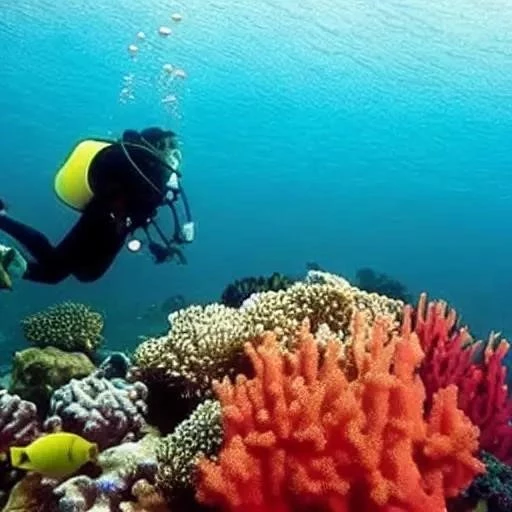Beneath the shimmering surface of our planet’s oceans lies a universe of breathtaking beauty, vibrant life, and profound tranquility․ For centuries, this aquatic realm remained a mystery, largely inaccessible to all but the most daring explorers․ Today, however, that narrative is dramatically changing․ Scuba diving, once considered an elite and niche pursuit, is experiencing an unprecedented surge in popularity, drawing millions into its captivating embrace․ From bustling coastal resorts to remote island hideaways, the call of the deep is resonating with a diverse and ever-growing audience, transforming leisure travel and fostering a new generation of ocean ambassadors․
This isn’t merely a passing trend; it’s a monumental shift in how humanity interacts with the marine world․ Driven by a potent mix of adventure tourism, increased awareness of ocean health, and remarkably accessible technology, the sport is expanding its reach into demographics previously untouched․ Imagine gliding effortlessly alongside a majestic manta ray, exploring ancient shipwrecks, or simply witnessing the kaleidoscope of a coral reef — these aren’t just fantasy scenarios, but everyday realities for the burgeoning community of certified divers worldwide․ The sheer scale of this growth underscores a powerful human desire to connect with nature on its most intimate terms, offering an escape from the terrestrial grind and a profound sense of discovery․
| Category | Key Information & Insights | Reference |
|---|---|---|
| Global Market Size | The global scuba diving equipment market alone was valued at approximately USD 2․6 billion in 2022 and is projected to reach over USD 4․5 billion by 2032, indicating robust growth in participation and associated spending․ | Statista |
| Certified Divers Worldwide | Estimates suggest there are over 20 million active certified scuba divers globally, with major organizations like PADI having issued over 28 million certifications since its inception․ New certifications continue to be issued at a rapid pace annually․ | PADI |
| Key Growth Drivers | Rising disposable incomes, the booming eco-tourism sector, increased focus on mental well-being (stress reduction through immersion), social media influence showcasing underwater beauty, and advancements in affordable, user-friendly equipment․ | Grand View Research |
| Economic Impact | Scuba diving significantly contributes to local economies, supporting dive centers, resorts, boat operators, equipment manufacturers, and associated tourism services in countless coastal communities worldwide․ | Malaysia Tourism (example regional impact study) |
| Environmental Connection | Divers often become passionate advocates for marine conservation, directly participating in clean-up efforts, citizen science projects, and supporting sustainable tourism practices, thereby intertwining recreation with ecological responsibility․ | PADI AWARE Foundation |
What fuels this accelerating passion? Primarily, it’s the profound sense of exploration and the unparalleled connection to nature that diving offers․ Unlike merely observing from a boat, becoming a diver means immersing oneself completely, becoming a silent, respectful guest in an alien world․ “It’s like unlocking a hidden library of the planet’s most intricate ecosystems,” comments Dr․ Eleanor Vance, a renowned marine biologist and avid diver․ “Every dive reveals new chapters, new species, new behaviors․ This intimate exposure profoundly impacts how people view conservation․” Indeed, many divers, having witnessed the fragility and splendor of coral reefs firsthand, transition into fervent advocates for marine protection, actively participating in reef restoration projects and advocating for sustainable practices․
Technological advancements have also played a pivotal role in democratizing access to this once-exclusive activity․ Modern scuba gear is lighter, more reliable, and significantly more affordable than ever before, dramatically lowering the entry barrier for prospective enthusiasts․ From advanced dive computers that simplify navigation and safety protocols to improved wetsuit materials ensuring comfort in varied temperatures, innovation has made the underwater world inviting to a broader spectrum of individuals․ Furthermore, the global proliferation of dive schools and resorts, offering certified training programs like those from PADI and SSI, has made earning a dive certification incredibly convenient, opening doors to millions eager to explore․
Beyond the gear and the certifications, social media has emerged as an undeniably powerful catalyst․ Stunning underwater photography and videography, shared instantly across platforms, showcase the breathtaking beauty of the ocean to a global audience, igniting curiosity and inspiring countless individuals to seek out their own subaquatic adventures․ Destinations like the Maldives, the Great Barrier Reef, and the Red Sea are no longer just names on a map but vivid, aspirational experiences brought to life through captivating digital narratives․ This visual storytelling, often featuring divers interacting harmoniously with marine life, acts as a potent call to action, transforming passive viewers into active participants․
Looking ahead, the future of scuba diving appears brighter and more impactful than ever․ The industry is consciously moving towards greater sustainability, with many operators adopting eco-friendly practices, minimizing their environmental footprint, and actively engaging in conservation․ By integrating insights from marine science and community-driven initiatives, dive tourism is evolving into a powerful tool for ocean advocacy and scientific research․ This forward-looking approach ensures that as more people discover the unparalleled joy of diving, they also become integral to the ongoing efforts to preserve the very ecosystems they cherish․ The journey beneath the waves is more than just a sport; it’s a transformative experience, profoundly connecting humanity with the pulse of our blue planet․






